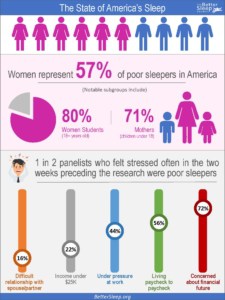
Read the report and view the infographic.
As part of May’s Better Sleep Month, the BSC launched a research study called The State of America’s Sleep, which sought to track America’s sleep quality over time, and its results unveiled the best and worst sleepers in America. Several common themes discovered are that the worst sleepers tend to be under stress, particularly at work, financially or in their personal relationships:
- Work Environment:
- Americans who are “under pressure at work” make up 44% of poor sleepers in the country.
- According to BSC research, about 80% of adults who feel they work in a friendly environment, enjoy the people they work with, and enjoy the work they do are excellent sleepers.
- Additionally, excellent sleepers are 27% more likely to be valued at work compared to poor sleepers.
- Financial Woes: Financially stressed adults lack excellent sleep at night. Adults who are concerned about their financial future comprise 72% of poor sleepers, and those who live paycheck to paycheck represent 56% of poor sleepers.
- Interpersonal Relationships: The research found that meaningful relationships impact quality of sleep. Adults who agree that they have a great relationship with their spouse/partner represent 88% of excellent sleepers, compared to adults who are in difficult relationships, which is only 9% of excellent sleepers.
“As the guardians of America’s sleep, it’s our duty to provide ongoing resources for people so they understand the importance of a good night’s sleep,” said Mary Helen Rogers, vice president of marketing and communications for the Better Sleep Council. “We launched The State of America’s Sleep study to see how Americans feel they are sleeping on an annual basis, so we can then assess elements that may or may not impact how they sleep. This research allows us to provide tips on changes people can make to improve their sleep habits, which directly aligns with our mission at the Better Sleep Council.”
Another surprising finding from the survey was the impact of the day’s news on Americans. Contrary to popular belief that the news is keeping people up at night, adults who agree that they enjoy watching/listening/reading the news every day comprise 64% of the best sleepers in America.
“These survey findings are a glimpse into the situations that impact Americans the most. Some of the research may seem surprising, but to clinicians in sleep medicine, it reflects what we see played out in our practice every day,” said Ellen Wermter, board-certified family nurse practitioner and BSC spokesperson. “The bottom line is that habits surrounding sleep matter. Set yourself up for success by prioritizing proper rest. Break the stimulant-sedative cycle, exercise, and give yourself adequate time to mentally wind down in order to better manage the anxiety-producing situations of life. A well-rested individual is more likely to be happy at work and in relationships, and to have the energy and drive to improve his or her current situation.”
*2,000 surveys were fielded from April 10-18, 2019, among a representative sample of U.S. adults (age 18+). Analysis was conducted to establish a Sleep Index (SI) that can be used to track America’s sleep quality over time. The index was used to create three groups, which are poor sleepers, average sleepers and excellent sleepers.
About the BSC
The Better Sleep Council is the consumer-education arm of the International Sleep Products Association, the trade association for the mattress industry. With decades invested in improving sleep quality, the BSC educates consumers on the link between sleep and health, and the role of the sleep environment, primarily through BetterSleep.org, partner support and consumer outreach.
###




